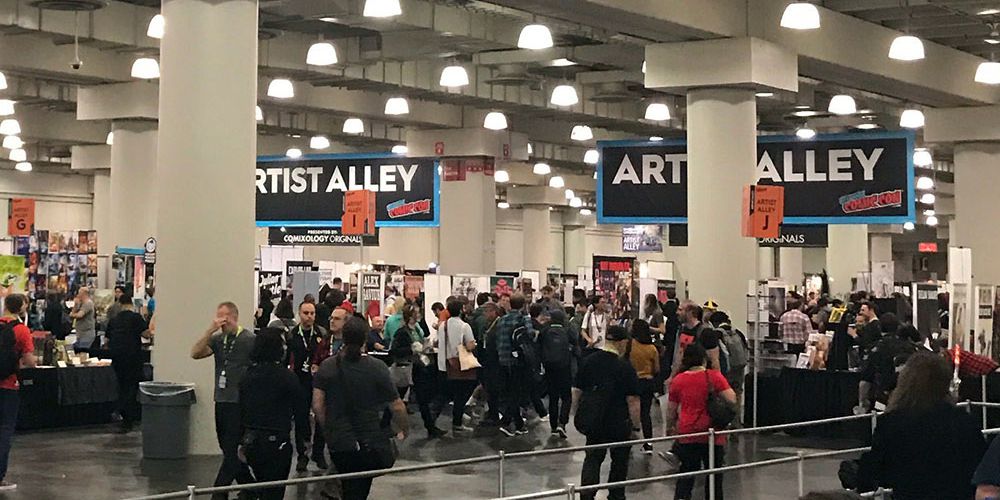Making that first step from guest to vendor at a big convention is exciting and scary.
If you're anything like me, you probably harboured a dream about selling your geeky products for a long time. I've changed careers since my convention heydays, but I can still remember the rush. To be able to sell your art surrounded by all things pop-culture is a thrill.
Unfortunately, that dream of being an "Artist Alley" vendor can butt up against the cold hard reality of actually planning a show. If you're selling your products at your first event, here are some things you should know.
1. You Will Get Sick
Either through stress, a lack of sleep, too much adrenaline or all three, you're likely to come down with a cold. And not just you, either—plenty of my Artist Alley friends would get sick at the same time even if we were never in the same room together. It became a running joke.
What we did to fix this:
- Get sleep where you can.
- Make sure you de-stress for 1-2 hours per day leading up to the convention.
- Drink lots of water and tea to keep your voice working. You'll be doing a lot of talking at the event.
Most importantly, bring cough drops, Tylenol/Advil, etc. to the show itself—whatever you need to fight off an illness. Even if you don't get sick before a con, the chances of it happening during the event are pretty high. You're in an inclosed space with thousands of other people packed closely together. You're selling goods to the public. There's always a risk.
2. Keep a Tight Budget
The truth about your first convention is that it will be hard to break even unless you budget like crazy. You won't have a big enough fanbase to sell all your merch, and you're competing with more seasoned vendors for cash.
Take into account your travel and accommodation—not just the cost of your table and products. These will affect your bottom line. When I worked local shows, all I had to worry about was my table. When I started going to bigger events, my reasonably priced products weren't enough to pull a profit. Travel was an extra expenditure that I couldn't afford on top of my other costs.
When you're first starting out, be honest with yourself. Ask yourself how much money you're willing to spend on your show. What can you budget, realistically? Can you only spend $600 on everything?
Even less?
If you can only spend $600, that's the cost of your table and your products combined. Food too, if you're lucky. That's not going to cover long-distance travel, which means you're limited to local events.
3. Prepare Products in Different Price Ranges
Once piece of advice I was given when I first started out was to have different products in different price ranges displayed on my table. It worked out well for me, so it's one I tell to others, too.
Some guests have lots of money to spend at a con. Others not so much, while others still are only willing drop their cash on very specific things.
That last group is a lost cause—you can't please them no matter how hard you try. But for the other two, it helps to have three to four products on your table that are priced at low, medium and high/more exclusive price points. This is so you don't exclude either group from your pool of clientele.
4. Expect 3 to 4 Months of Prep Time
You can't underestimate how long it takes to put together quality products. You also need to understand how long all the back-end stuff will take to organize. On top of your products, you need to deal with:
- Convention paperwork
- Table arrangements
- Marketing
- Travel plans
- Accommodations
- Booking time off from your day job
If you're a brand new vendor, it will take you 3-4 months to do this. This is especially true if you need to create your catalogue of products from scratch.
5. It's Okay to Have a Bad (First) Show
Not all shows will go well. You might do all this prep but despite your best efforts you end up losing money. Years ago I had a bad show. The crowds didn't materialize because of the weather, and I felt so defeated by my poor sales I swore off art entirely.
However, after a few months I dusted myself off and I got back in the saddle. I started doing conventions again. Slowly but surely I got better.
When you learn from a bad experience it's always a positive towards your overall career. This list contains just a handful of tips on convention prepping, but the key thing to keep in mind is to go into it with a clear head. If you do that, you're already on the right track.
Looking for a list of events you can sell your work at? Check out all the nerdy conventions you should attend at least once.
